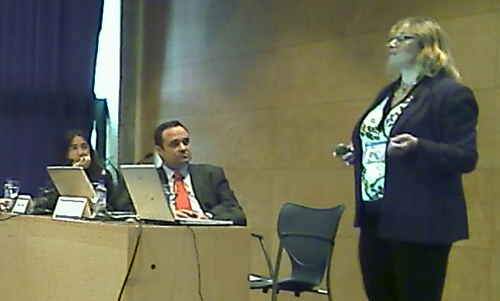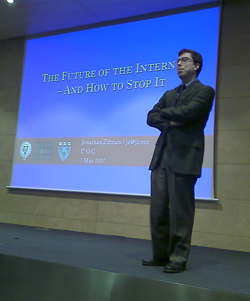By Ismael Peña-López (@ictlogist), 07 May 2007
Main categories: Cyberlaw, governance, rights, Meetings
Other tags: idp, idp2007
No Comments »
The Congress on Internet, Law and Politics has the aim of continuing the task of reflecting on, analyzing and discussing the main changes taking place in law and politics in the information society. This third congress focuses on the questions that currently represent the most important challenges and new developments in the fields of copyright, data protection, Internet security, problems of responsibility, electronic voting, and the new regulation of e-Administration, as well as dedicating a specific area to the current state of the use of new technologies by law professionals.
From Casual Censorship to Cartelisation? ISP Control of Illegal and Harmful Content
Lilian Edwards, Professor of Internet Law. Law School, University of Southampton
If you want to regulate content, you first go to Internet Service Providers (ISPs). And there is a big difference among information stored for transiently issues (transmission, caching) it becomes hosting, and thus legal issues apply.
A “notice and take down” regime, based on that there is no criminal liability if there is no atual knowledge of illegal activity or information, and no civil liability without actual knowledge or awareness of facts or circumstances from which illegal activity or information is apparent, and there is no active seek or profit.
But what really happens when a notice to take down takes place? What does the ISP do? What can be done? Are ISPs becoming “censors” or “arms of the state”? If they don’t do anything… are they pornographers? The AHRC Centre in IP and Technology carried on a survey to shred some light.
Institutionalisation: ISPs cut down costs of transaction of court procedures, as they easy enable both taking down i.e. pirate content and ID disclosing of major uploaders.
Cartelisation: The Internet Watch Foundation was originally created to defend ISP industry from threatened police action for carrying illegal newsgroup content. Thus, it acts as a self regulation device.
What’s next? potential for perfect invisible censorship? from self regulation to co-regulation? Specially when instead of child porn (the subject of IWF) we go no “not that clear” issues like racism or gender discrimination.
The results of the survey are not (statistically) significant, but (intuitively) quite enlightening. There are quite huge variations in the number of NTD claims received; traditional media usually get “defamation” complaints; etc. But… do they take down content? No, they not automatically do it. Instead of removing a whole website because of just one file (difficult for the ISP to find), they would “NTD” the owner of the site to do it in their place.
And no, ISPs don’t usually ask third parties (i.e. lawyers) if the NTD was legally right or appropriate, partly because there was not corporate people or knowledge about legal issues.
There is also little enthusiasm for “cartelised” behaviour.
On the other hand, main exchange of illegal content happens outside websites, but through instant messaging or P2P networks that make tracking very difficult. Hence, is there any sense on ISPs wasting their time in web filtering? And if this has a cost (as it does) and you have to cut down costs, where would you begin with if your core activity is in selling hosting, not in content controlling? But, surprisingly (from a profit point of view), ISPs actually care for “values”, and they care and collaborate because of personal bounds among flesh-and-bone persons ruling ISPs.
 Left to right: Raquel Xalabarder, Miquel Peguera, Lilian Edwards
Left to right: Raquel Xalabarder, Miquel Peguera, Lilian Edwards
Liability of middlemen: state of the question 5 years after the LSSICE
Miquel Peguera, Professor of Mercantile and New Technology Law, UOC School of Law
Professor Peguera explains some well-known court cases related to ISP liability in Spain.
One of the main things that he puts clear is that it does not seem that anyone (lawyers, judges, infringers and offended parties) is perfectly aware of how the law works, with stress in the point where there is or there is not liability for ISPs, which is specially sad in the case of lawyers and judges.
3rd Internet, Law and Politics Congress (2007)
By Ismael Peña-López (@ictlogist), 07 May 2007
Main categories: Cyberlaw, governance, rights, Hardware, Meetings
Other tags: idp, idp2007
No Comments »
The Congress on Internet, Law and Politics has the aim of continuing the task of reflecting on, analyzing and discussing the main changes taking place in law and politics in the information society. This third congress focuses on the questions that currently represent the most important challenges and new developments in the fields of copyright, data protection, Internet security, problems of responsibility, electronic voting, and the new regulation of e-Administration, as well as dedicating a specific area to the current state of the use of new technologies by law professionals.
One of the biggest struggles in History has been literacy. Now that that it seemed [at least in developing countries] that we had achieved some “good” literacy level, then comes the Internet and everyone has to get into digital literacy. Indeed, last year [2006] more transistors were produced than rice grains.
Data ownership goes back to the citizen. Data is not a Government property, but citizens’. the big challenge to e-Administration is not putting online all procedures, but making them disappear. An event (i.e. your husband’s death) should automatically activate all kind of procedures (i.e. widow subsidies) without the need of having to apply for them.
Universal access should cover telephony (both fixed and mobile lines), broadband, audiovisual services and content. This access means information, training and, actually, more democratic exercise, transparency, etc.
Keynote speech: The Future of Internet and How To Stop It
Jonathan Zittrain, Professor of Internet Governance and Regulation, Oxford Internet Institute
 Jonathan Zittrain
Jonathan Zittrain
One model of computer: in the hands of experts, you rent a solution, that comes from designing software and putting it into hardware, but you never ever approach neither the machine nor the design of the solution. This is IBM’s model when it was created back in the times of Herman Hollerith when he calculated the US 1890 census. IBM (then the Tabulating Machine Company) had “general purpose” machines that could be reprogrammed for whatever.
Flexowritter represented a second model: one solution, unchangeable, nonreprogrammable, but you could have it home.
Bill Gates made up a general purpose personal computer: it could be reprogrammed by the end user, that had the machine at home.
And the story with Networks is alike. Prodigy and Compuserve would show the user closed content depending on what he wanted (i.e. Weather) and who he was (i.e. Professional).
The birth of the Internet, the network its founders built, was totally open: it had an “hourglass” architecture where any use, any platform, were joined by a common “bypass”: IP, that just moved bits from one place to another.
And collaboration goes on an on. More and more software is built upon a “procrastination principle”: we build it until here and someone will go further
. But this kind of collaboration can also be subverted to break others’ barriers to secure their content, etc.
And now the problem is that you can not malicious code, malware, viruses, etc. from operating or entering your own system without being disconnected from the Network… or go out of the generative PC paradigm where everyone could program/contribute with his own code/content. If we are going back to the “main menu”, where all options are predetermined, is this the end of the generative Internet? actually, is this the end of the Internet itself? And same applies to who connects to what . It looks like our needs to “save” our systems, are creating more and more barriers similar to those of censorship (something dealt with at the OpenNet Initiative).
Stop BadWare is about writing a software that should help knowing how some other software works and whether it is making “happier” your computer (and its user).
The generative pattern:
- Origins in a backwater
- Ambitious but not fully planned: procrastination principle
- Contribution welcomed from all corners
- Success beyond expectation
- Influx of usage
- Success is cut short: movement towards enclosure
The solution? For the solution to be true to the generative pattern, it must be originated in a backwater. The Internet is an educative system: it does require to people to give feedback and build along with the others.
See also:
3rd Internet, Law and Politics Congress (2007)



